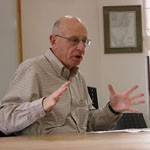
JERUSALEM — Israel’s passions come to the fore during the 48 hours of Memorial Day and then Independence Day. Sadness, sacrifice, and joy. Along with considerable dispute as to how the sentiments should be marked.
Memorial Day, last Wednesday, commemorated 24,068 persons who lost their lives while in the military and 4,216 victims of terror. Fifty-six soldiers have been killed in the most recent year.
The numbers may be subject to dispute, as well as the starting date of recording, which in some calculations begins in the middle of the 19th century.
The day in the media was marked by numerous stories, told by family members and friends, detailing the lives of the victims, and the nature of their deaths. Those covered range from senior officers in the IDF, members of the Haredi military corp, Israeli minorities (Druze, Christians, Muslims, Circassians), as well as ordinary soldiers. It’s endless, sad, and reminds us of the personal costs of Israel’s existence. As well as quarrels as to who should be remembered, and how.
It’s also a time for family members to visit military cemeteries. Soldiers precede the day by decorating graves. Families come to sit, stare, clean the grave site, water plants, plant some more, and think about the past.
There are several occasions for sirens to sound, and lots of ceremonies in various sites and institutions to mark the day.
Our own retirement village had a program which combined readings in Hebrew and English, along with music from individual singers and the Village choir.
Independence Day is much different.
Usually it started with a fireworks display on Mount Herzl, and local fireworks elsewhere. But this year, at least on Mt Herzl and in Tel Aviv, the fireworks have been deleted. That’s out of concern for individuals suffering PTSD (post-traumatic stress disorder) who react badly to the noise that may remind them of battle.
That cancellation is a matter of dispute. Or one of the disputes focused on how the day should be celebrated.
Instead of the fireworks there was an elaborate show of dance, along with silent sprays of light.
In any case, it’s a time of joy, with travel, picnics, and much celebration by families and friends. Parks are crowded throughout the country. This year there’s commentary on jamming at the entry to Sinai south of Eilat, where thousands were kept waiting for hours, and some decided to turn around and go home without attaining what they had wanted in the desert or along the waterfront.
The combination of the two days makes us think about Israel’s existence, with memories of persecution, attack, destruction and death, and on the other side a concern for where we have gone in terms of becoming a small but important power. Attracting immigrants, currently from Ukraine and Russia, as well as Moldova and places more serene. We’ve created linkages, either formal or less so, with a number of Muslim countries. And there’s been at least a small movement of Jews along with Syrians, Lebanese, and others to mark Israel’s Holocaust Day.
Along with protest of those who object to any mention of Arabs, or non-Jews, in what they think should be a time to remember Israel’s Jewishness.
As Jews, we quarrel. And our media reports the quarrels. As well as the major themes of remembering and celebrating.
As Independence Day was concluding, there occurred a sad reminder of our problems. Two young terrorists, appoarently without any connection with organizations, entered the Haredi-Religious small city of Elad, and killed with hatchets three men, each of them the fathers of five or six children, and seriously woounded a number of others.
Palestinian Authority President Mahmoud Abbas condemned the terror attack, along with citing the Jews for spoiling al Aqsa with their presence. Against him, a prominent spokesman for Hamas in Gaza, Yehya Ibrahim Sinwar, praised the killing and encouraged more.
The next day’s newspapers included articles calling for Sinwar’s death.
Now we’re hearing that the Defense Ministry has informed Hamas that it wishes to avoid an escalation.
The two killers at Elad were apprehended less than three days after their actions, hidden close to Elad, without means to get over the border or to affect other killings.
Additional attacks ended with the killing of the attackers. It’s not quiet.
Eighteen killed by terror in six incidents since the 22nd of March, signify continued animosity to Israel’s existence. Even though many or most of those guilty were not formally connected with organizations, the animosity is widespread. Incitement continues, along with Israel’s decent relations with a number of Muslim countries. Can anything be done to stop the violence? Or is it a price of being Jewish, in a country that is mostly Jewish?
*
Ira Sharkansky, Ph.D., is professor emeritus of political science at Hebrew University. He may be contacted via ira.sharkansky@sdjewishworld.com